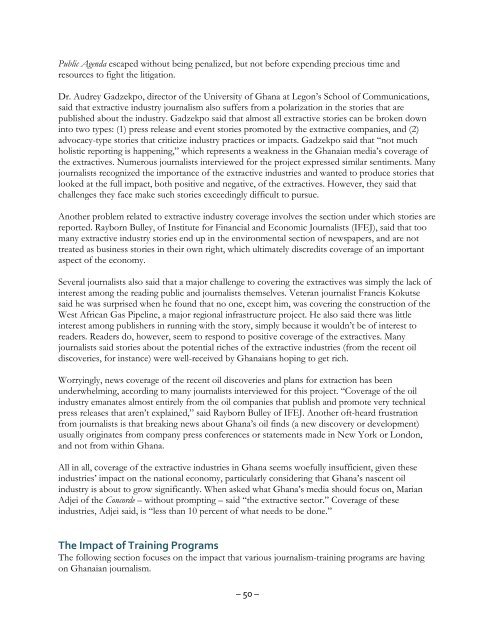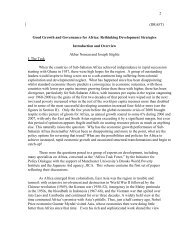THERE WILL BE INK - Initiative for Policy Dialogue
THERE WILL BE INK - Initiative for Policy Dialogue
THERE WILL BE INK - Initiative for Policy Dialogue
You also want an ePaper? Increase the reach of your titles
YUMPU automatically turns print PDFs into web optimized ePapers that Google loves.
Public Agenda escaped without being penalized, but not be<strong>for</strong>e expending precious time andresources to fight the litigation.Dr. Audrey Gadzekpo, director of the University of Ghana at Legon’s School of Communications,said that extractive industry journalism also suffers from a polarization in the stories that arepublished about the industry. Gadzekpo said that almost all extractive stories can be broken downinto two types: (1) press release and event stories promoted by the extractive companies, and (2)advocacy-type stories that criticize industry practices or impacts. Gadzekpo said that “not muchholistic reporting is happening,” which represents a weakness in the Ghanaian media’s coverage ofthe extractives. Numerous journalists interviewed <strong>for</strong> the project expressed similar sentiments. Manyjournalists recognized the importance of the extractive industries and wanted to produce stories thatlooked at the full impact, both positive and negative, of the extractives. However, they said thatchallenges they face make such stories exceedingly difficult to pursue.Another problem related to extractive industry coverage involves the section under which stories arereported. Rayborn Bulley, of Institute <strong>for</strong> Financial and Economic Journalists (IFEJ), said that toomany extractive industry stories end up in the environmental section of newspapers, and are nottreated as business stories in their own right, which ultimately discredits coverage of an importantaspect of the economy.Several journalists also said that a major challenge to covering the extractives was simply the lack ofinterest among the reading public and journalists themselves. Veteran journalist Francis Kokutsesaid he was surprised when he found that no one, except him, was covering the construction of theWest African Gas Pipeline, a major regional infrastructure project. He also said there was littleinterest among publishers in running with the story, simply because it wouldn’t be of interest toreaders. Readers do, however, seem to respond to positive coverage of the extractives. Manyjournalists said stories about the potential riches of the extractive industries (from the recent oildiscoveries, <strong>for</strong> instance) were well-received by Ghanaians hoping to get rich.Worryingly, news coverage of the recent oil discoveries and plans <strong>for</strong> extraction has beenunderwhelming, according to many journalists interviewed <strong>for</strong> this project. “Coverage of the oilindustry emanates almost entirely from the oil companies that publish and promote very technicalpress releases that aren’t explained,” said Rayborn Bulley of IFEJ. Another oft-heard frustrationfrom journalists is that breaking news about Ghana’s oil finds (a new discovery or development)usually originates from company press conferences or statements made in New York or London,and not from within Ghana.All in all, coverage of the extractive industries in Ghana seems woefully insufficient, given theseindustries’ impact on the national economy, particularly considering that Ghana’s nascent oilindustry is about to grow significantly. When asked what Ghana’s media should focus on, MarianAdjei of the Concorde – without prompting – said “the extractive sector.” Coverage of theseindustries, Adjei said, is “less than 10 percent of what needs to be done.”The Impact of Training ProgramsThe following section focuses on the impact that various journalism-training programs are havingon Ghanaian journalism.– 50 –














